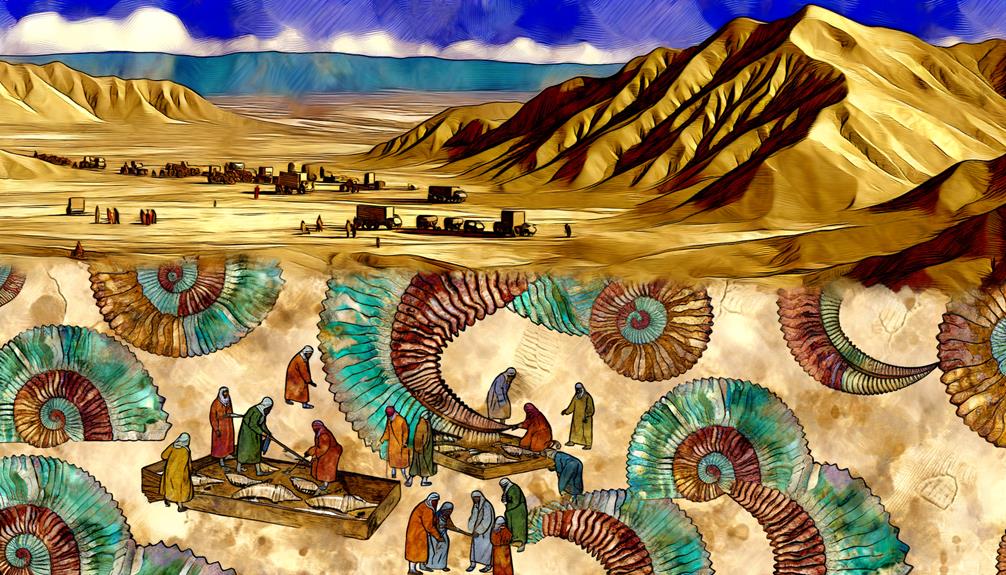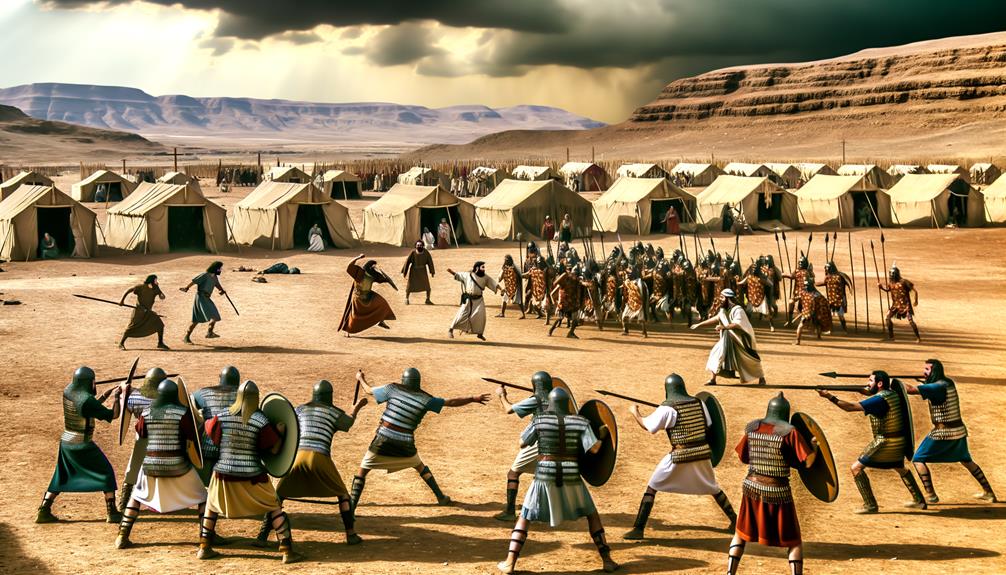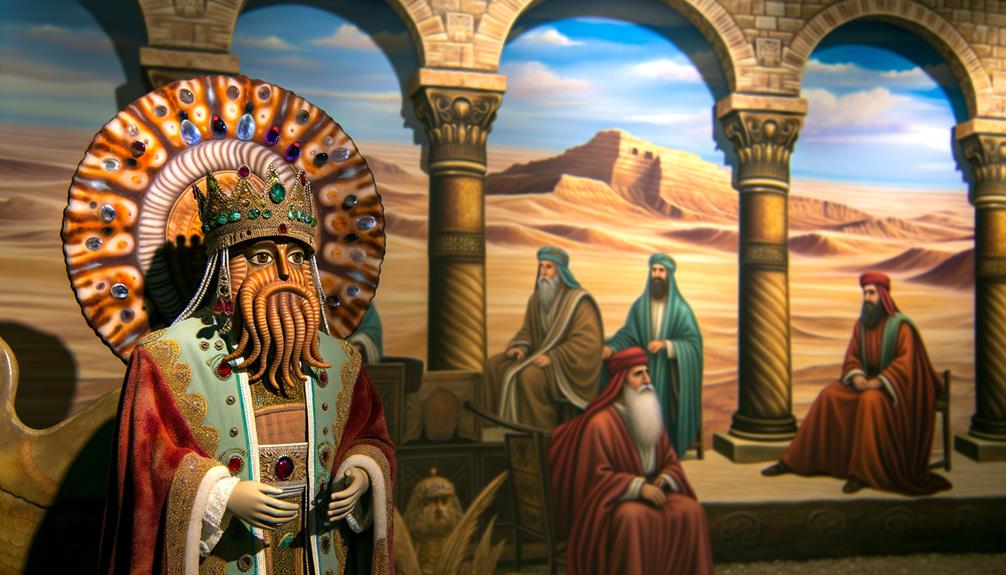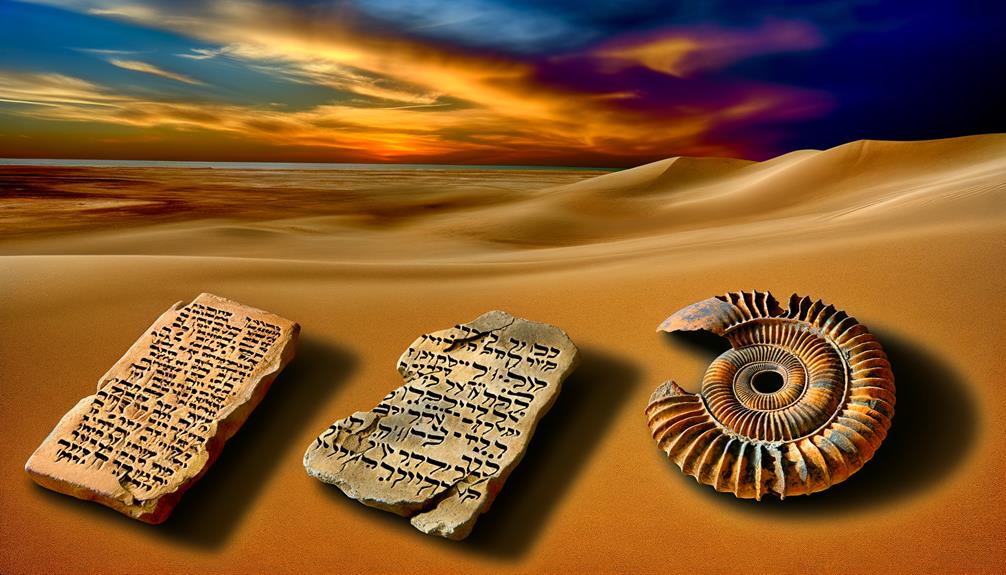Meaning of Ammonites in the Bible: Ancient Adversaries
The Ammonites in the Bible trace their origins to Lot’s son, Ben-Ammi, born of an incestuous union (Genesis 19:36-38), and were perennial adversaries of the Israelites, inhabiting territory east of the Jordan River. Their history is marked by fierce territorial disputes and frequent conflicts over inheritance rights and religious practices, especially the worship of Milcom, which starkly contrasted with Israelite worship of Yahweh.
Several biblical prophecies, such as in Jeremiah 49:1-6 and Ezekiel 25:1-7, predict the Ammonites’ downfall due to idolatry and cruelty, underscoring deeper themes of divine judgment and the consequences of moral corruption. Exploring these narratives enriches one’s understanding of covenant fidelity and divine sovereignty.

Meaning of Ammonites in the Bible: Origin, Role, and Spiritual Significance
| Aspect | Details |
|---|---|
| Name | Ammonites |
| Meaning | Descendants of Ammon, meaning “tribal” or “a people” |
| Origin | Born from the incestuous union of Lot and his younger daughter (Genesis 19:38) |
| Relationship to Israel | Often in conflict with Israel; sometimes allied |
| Key Scripture | Deuteronomy 2:19, Judges 11, 2 Chronicles 20 |
| Spiritual Symbolism | Represents moral compromise, idolatry, and opposition to God’s covenant people |
| Prophetic Judgment | Condemned for idolatry and cruelty; judged by God through prophets |
Origin of the Ammonites

The origin of the Ammonites, as delineated in the Bible, traces back to the incestuous relationship between Lot and his younger daughter, a narrative that unfolds in Genesis 19:36-38. This union resulted in the birth of Ben-Ammi, the progenitor of the Ammonite people.
Theologically, this account underscores the complex interplay of human frailty and divine providence. Historically, the Ammonites occupied the region east of the Jordan River, an area that became known as Ammon.
Scriptural analysis reveals that their lineage, marked by unconventional beginnings, greatly influenced their interactions with neighboring Israelites. This origin story not only provides a genealogical framework but also sets the stage for understanding subsequent biblical narratives involving the Ammonites.
Ammonites and Lot

Understanding the relationship between the Ammonites and Lot requires a closer examination of the biblical narrative that details their contentious interactions with the Israelites.
The Ammonites are descendants of Lot, Abraham’s nephew, through an illicit union with his younger daughter following the destruction of Sodom and Gomorrah (Genesis 19:36-38). This origin story sets a complex theological backdrop, highlighting themes of sin and divine judgment.
Historically, the Ammonites frequently clashed with the Israelites, as evidenced in numerous scriptural accounts (Judges 11:4-33; 1 Samuel 11:1-11). Their antagonistic relationship underscores the broader narrative of Israel’s struggle against surrounding nations, as well as the moral and spiritual implications of their lineage from Lot.
This historical enmity shapes their portrayal within the biblical text.
Ammonite Territories

The territories of the Ammonites, often referenced in the Old Scriptures, encompass a region east of the Jordan River, delineated by historical boundaries that include key cities such as Rabbah.
Scriptural narratives highlight the geopolitical significance of these lands, reflecting their strategic importance and frequent conflicts with neighboring tribes.
Understanding the precise locations and settlements within Ammonite territory provides valuable insights into the historical and theological context of Israel’s interactions with this ancient people.
Historical Boundaries Defined
Ammonite territories, historically situated east of the Jordan River, played a significant role in the biblical narrative and geopolitical landscape of ancient Israel.
These lands were defined by clear boundaries which influenced interactions with neighboring entities.
The Bible delineates these borders with precision:
- Northern Boundary: The Jabbok River, which separated Ammon from Gilead (Deuteronomy 3:16).
- Eastern Boundary: Extending towards the desert, marking the limit of settled land (Joshua 13:10).
- Southern Boundary: The Arnon River, a natural divider from Moabite territory (Numbers 21:24).
- Western Boundary: The Jordan River, a significant barrier and point of contention (Judges 11:13).
These demarcations underscored the Ammonites’ distinct cultural and political identity within the biblical context.
Key Cities and Settlements
Among the notable cities within Ammonite territories, Rabbah stands out prominently as a central hub of political and military activity, frequently referenced in scriptural accounts such as 2 Samuel 11:1.
This city, known today as Amman, served as a focal point for the Ammonite kingdom, showcasing its strategic importance. Other significant settlements included Heshbon, Medeba, and Jazer, each contributing to the cultural and economic fabric of the region.
Understanding these cities offers deeper insights into the historical and theological context of the Ammonites as depicted in biblical narratives.
| City | Scriptural Reference |
|---|---|
| Rabbah | 2 Samuel 11:1 |
| Heshbon | Numbers 21:26-30 |
| Medeba | Joshua 13:9 |
| Jazer | Numbers 21:32 |
| Amman | Modern-day Rabbah |
These cities reflect the complex socio-political landscape of ancient Ammon.
Geopolitical Significance Explained
Intricately positioned between powerful neighboring kingdoms, the territories of the Ammonites held substantial geopolitical significance in biblical history.
Their land, east of the Jordan River, was a crucial region for several reasons:
- Trade Routes: The Ammonite territory served as a crucial juncture for ancient trade routes connecting Mesopotamia, Egypt, and the Arabian Peninsula.
- Military Strategy: Control over this area provided strategic military advantages, particularly during conflicts with Israel and other regional powers.
- Economic Resources: The land was rich in resources, including fertile agricultural zones and access to essential water sources.
- Cultural Interactions: The Ammonites’ interactions with neighboring kingdoms influenced religious and cultural exchanges, as evidenced in biblical narratives.
Scriptures such as Deuteronomy 2:19 and Judges 11:13-27 highlight these dynamics.
Religious Practices

In the context of religious practices, the Ammonites were known for their idolatry and worship of the god Milcom, which often brought them into direct conflict with the monotheistic worship of Yahweh as prescribed in the Hebrew scriptures.
The worship of Milcom, also referred to as Molech, involved rituals that were starkly opposed to Yahwistic principles, including child sacrifice, as mentioned in Leviticus 18:21. This form of worship highlighted a significant theological divergence between the Ammonites and the Israelites.
Historical records and biblical texts like 1 Kings 11:5-7 further illustrate the detriment of these practices, emphasizing the prophetic condemnations against such idolatry.
Understanding these religious practices provides essential insight into the broader spiritual and cultural landscape of the ancient Near East.
Conflicts With Israel

The Ammonites frequently clashed with Israel over territorial disputes, as documented in various scriptural accounts, including Judges 11 and 1 Samuel 11.
These conflicts often resulted in military engagements and battles, reflecting the broader geo-political tensions of the ancient Near East.
The recurring hostilities between these two nations underscore the persistent struggle for dominance and survival in the region, as well as the theological implications of divine favor and judgment.
Territorial Disputes With Israel
Throughout biblical history, the Ammonites frequently engaged in territorial disputes with Israel, which were rooted in both ancestral claims and religious differences. These conflicts are illuminated by several key factors:
- Inheritance Rights: The Ammonites, descendants of Lot, often contested Israelite claims to land, citing ancient familial ties (Genesis 19:37-38).
- Religious Differences: The worship of the Ammonite god Milcom contrasted sharply with Israel’s monotheism, fueling animosity (1 Kings 11:5).
- Strategic Locations: Control over the Transjordan region was essential for trade and military advantage, leading to frequent clashes.
- Divine Promises: Israel’s belief in divine entitlement to the land, as promised to Abraham, often clashed with Ammonite territorial assertions (Genesis 15:18-21).
These underlying factors perpetuated a cycle of dispute and tension.
Military Engagements and Battles
A critical examination of biblical texts reveals that the military engagements between the Ammonites and Israel were marked by significant theological and historical implications.
The Ammonites, descendants of Lot, frequently clashed with Israel, as recorded in texts such as Judges 11 and 2 Samuel 10. These conflicts were not merely territorial but were imbued with divine judgment and covenantal themes.
For instance, Jephthah’s victory over the Ammonites in Judges 11 underscored God’s favor towards Israel in response to their repentance. Similarly, David’s battles against Ammon in 2 Samuel 10 highlighted the Davidic covenant’s unfolding.
These narratives illustrate the Ammonites’ role as both adversaries and instruments in God’s broader redemptive plan, emphasizing the intricate interplay between divine sovereignty and human agency.
Ammonite Kings

Ammonite kings, often depicted in the Hebrew Bible, played significant roles in the geopolitical and spiritual landscape of ancient Israel. These monarchs are frequently mentioned in the context of conflicts and alliances, highlighting their influence. Their interactions with Israel are marked by several key aspects:
Hostility and Warfare: The Ammonite kings frequently engaged in battles against Israel, as recorded in Judges 11 and 1 Samuel 11.
Political Alliances: At times, alliances were formed, such as between King David and Nahash of Ammon (2 Samuel 10).
Religious Tensions: The worship of Milcom, the Ammonite deity, often clashed with Israelite monotheism (1 Kings 11:7).
Scriptural Significance: Their actions and policies frequently influenced biblical narratives and prophecies.
Prophecies Against Ammonites

Numerous biblical prophecies foretell the downfall of the Ammonites, reflecting both divine judgment and the geopolitical realities of the ancient Near East.
Scriptures such as Jeremiah 49:1-6, Ezekiel 25:1-7, and Amos 1:13-15 articulate the reasons for this judgment, including their idolatry, cruelty, and hostility towards Israel.
Jeremiah speaks of Rabbah’s desolation, while Ezekiel prophesies that Ammon will be given to the people of the East.
These prophecies underscore the intersection of divine sovereignty and historical events, illustrating how the Ammonites’ actions warranted severe repercussions.
The prophetic literature consequently serves as a theological lens, revealing God’s justice and the moral failings of nations, and providing a critical historical context for understanding the biblical narrative.
Lessons From Ammonites

Reflecting on the prophetic judgments against the Ammonites, one can extract profound lessons about the consequences of idolatry, moral corruption, and enmity towards God’s chosen people. The biblical narrative provides essential insights:
- Divine Justice: God’s retribution against the Ammonites underscores His unwavering commitment to justice (Ezekiel 25:1-7).
- Moral Integrity: The Ammonites’ downfall illustrates the peril of forsaking moral principles for temporal gains (Jeremiah 49:1-6).
- Covenant Loyalty: Their animosity towards Israel highlights the significance of honoring God’s covenant and its people (Deuteronomy 23:3-4).
- Idolatry’s Consequences: Persistent idol worship by the Ammonites serves as a stark warning against turning away from God (1 Kings 11:5).
These lessons resonate with timeless theological and ethical implications.
Ammonites in Historical Context

Nestled within the ancient Near East, the Ammonites emerge in biblical texts as a significant Semitic group often in conflict with Israel, providing rich material for understanding the interplay of geopolitics and divine narratives in antiquity.
Originating from Lot’s descendants, the Ammonites occupied the region east of the Jordan River. Their interactions with Israel, depicted vividly in the Hebrew Scriptures, highlight both divine judgment and mercy.
For instance, their opposition in Judges 11 and their eventual subjugation by King David in 2 Samuel 12 offer insight into the cyclical nature of conflict and reconciliation.
The Ammonites’ presence underscores a broader theological narrative of covenant fidelity and divine sovereignty, enriching our comprehension of Israel’s historical and spiritual journey.
Conclusion
The narrative of the Ammonites in biblical texts unfolds a complex tapestry of origin, conflict, and prophecy.
From their descent from Lot to their territorial disputes and idolatrous practices, the Ammonites’ story is interwoven with the fate of Israel.
Scriptural prophecies foretell their eventual downfall, serving as divine retribution.
What remains to be fully grasped is the profound lesson their history imparts, a lesson that beckons deeper theological reflection and historical scrutiny.






